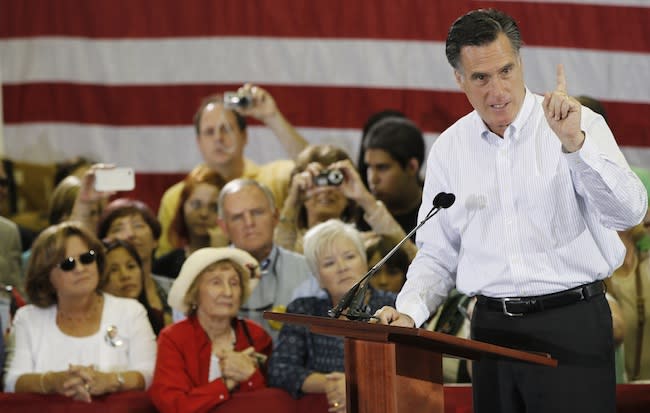 The Ticket
The TicketRomney confronts a very different Latino voter in Nevada

Mitt Romney--who was labeled "anti-immigrant" by Newt Gingrich for saying illegal immigrants should self-deport--did very well with Hispanic voters in Florida, who helped him handily win Tuesday's primary.
Fifty four percent of Hispanic voters in the Florida exit poll said they voted for Romney, compared to just 45 percent of white voters. The ex-governor worked for their vote: softening his opposition to the Dream Act, running Spanish-language ads starring one of his sons, and lining up key endorsements from Cuban-American politicians in the state.
But this brief honeymoon is over, according to Stanford professor and Latino Decisions pollster Gary Segura. "Latinos matter to Republicans in Florida and ... on general election day," Segura said. The majority of Hispanic voters in the West are Democrats or Democrat-leaning and aren't likely to show up to vote in the Republican primaries. In Nevada, only 5 percent of likely Republican caucus-goers are Hispanic, even though Latinos make up more than a quarter of the total population. And immigration reform, which Romney opposes, is a personal and important issue for many Western Latino voters.
Gingrich was unsuccessful in using Romney's anti-illegal immigrant stance against him in Florida, but immigration reform doesn't carry the same weight for Latinos in the state as it does nationwide. Many of Florida's Hispanic Republicans are of Cuban and Puerto Rican descent. Cubans and Puerto Ricans don't face the same immigration hurdles as other Latinos because Cubans are granted a path to citizenship once they arrive to the country and Puerto Ricans are U.S. citizens, not immigrants.
The majority of U.S. Hispanic voters are of Mexican descent and nearly 90 percent of American Latinos are within two generations of immigrating to the United States. Nationwide, a quarter of registered Latino voters know someone who is in deportation proceedings or has been deported, and more than half (54 percent) know at least one person who lacks legal immigration status, according to Latino Decisions. "Even though they are citizens, when you speak about immigrants you are speaking about them, their parents or their grandparents," Segura said.
Romney and his surrogates have made the case that Hispanic voters will gravitate to his campaign because of his promise to improve the economy; polls show that the economy is Hispanic voters' number one priority. But a Latino Decisions poll from November found that 59 percent of voters who agree with a hypothetical candidate's economic platform would be less likely to vote for him if he said he would "never support amnesty for illegals." Romney hasn't said those exact words, but a Spanish-language ad from a Democratic group currently running in Nevada includes a clip of him telling New Hampshire voters that: "A lot of people just come here that have no skill, no education, and are looking for a free deal." In an earlier debate, he referred to illegal immigrants as "illegals," several times. Republican New Mexico Gov. Susana Martinez cautioned earlier this month that this type of rhetoric could hurt her party, urging the candidates to tone it down on immigration.
Romney has said that no illegal immigrants already living in America should be granted legal status, with the exception of young people brought here as children who agree to serve in the military. Gingrich says older immigrants with ties to their communities should be allowed to stay if local leaders want them to.
As Stephan Dinan of the Washington Times points out, John McCain also nabbed 54 percent of the Hispanic vote in Florida's 2008 primary, before losing Florida Latinos in the general election to Barack Obama, 57 percent to 42 percent. McCain only won 30 percent of the Hispanic vote nation-wide that year, 10 crucial points under President George W. Bush's performance with the group in 2004. Segura and other analysts say 40 percent is an "educated guess" of how much of the Hispanic vote a Republican will have to capture in order to win the general election, depending on turnout.
Other popular Yahoo! News stories:

